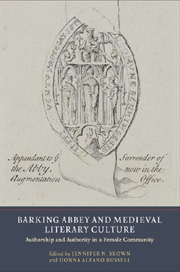Book contents
- Frontmatter
- Contents
- List of Contributors
- Acknowledgements
- List of Abbreviations
- Dedication
- Introduction: Barking's Lives, the Abbey and its Abbesses
- I BARKING ABBEY AND ITS ANGLO-SAXON CONTEXT
- II BARKING ABBEY AND ITS ANGLO-NORMAN CONTEXT
- 5 ‘Sun num n'i vult dire a ore’: Identity Matters at Barking Abbey
- 6 ‘Ce qu'ens li trovat, eut en sei’: On the Equal Chastity of Queen Edith and King Edward in the Nun of Barking's La Vie d'Edouard le confesseur
- 7 Body, Gender and Nation in the Lives of Edward the Confessor
- 8 Clemence and Catherine: The Life of St Catherine in its Norman and Anglo-Norman Context
- 9 Cicero, Aelred and Guernes: The Politics of Love in Clemence of Barking's Catherine
- 10 The Authority of Diversity: Communal Patronage in Le Gracial
- III BARKING ABBEY AND THE LATER MIDDLE AGES
- Afterword. Barking and the Historiography of Female Community
- Bibliography
- Index
- YORK MEDIEVAL PRESS: PUBLICATIONS
5 - ‘Sun num n'i vult dire a ore’: Identity Matters at Barking Abbey
from II - BARKING ABBEY AND ITS ANGLO-NORMAN CONTEXT
Published online by Cambridge University Press: 05 April 2013
- Frontmatter
- Contents
- List of Contributors
- Acknowledgements
- List of Abbreviations
- Dedication
- Introduction: Barking's Lives, the Abbey and its Abbesses
- I BARKING ABBEY AND ITS ANGLO-SAXON CONTEXT
- II BARKING ABBEY AND ITS ANGLO-NORMAN CONTEXT
- 5 ‘Sun num n'i vult dire a ore’: Identity Matters at Barking Abbey
- 6 ‘Ce qu'ens li trovat, eut en sei’: On the Equal Chastity of Queen Edith and King Edward in the Nun of Barking's La Vie d'Edouard le confesseur
- 7 Body, Gender and Nation in the Lives of Edward the Confessor
- 8 Clemence and Catherine: The Life of St Catherine in its Norman and Anglo-Norman Context
- 9 Cicero, Aelred and Guernes: The Politics of Love in Clemence of Barking's Catherine
- 10 The Authority of Diversity: Communal Patronage in Le Gracial
- III BARKING ABBEY AND THE LATER MIDDLE AGES
- Afterword. Barking and the Historiography of Female Community
- Bibliography
- Index
- YORK MEDIEVAL PRESS: PUBLICATIONS
Summary
‘For the moment, she does not wish to say her name.’ With these words the author of the twelfth-century Vie d'Edouard le confesseur deflects the gaze of her audience away from her own personal identity back towards the only name she reveals, that of the convent where she has written this work, the well-known foundation of Barking Abbey. At the period when this vernacular life was written, Barking Abbey's long tradition of learning and royal connections had been revived following the Norman Conquest. With each successive modern study that demonstrates that in the twelfth century this was a sophisticated, learned community of women religious who were influential both politically and socially, our modern wish to lift the veil obscuring the identity of this writer becomes more pressing. Who was this anonymous nun of Barking, now generally accepted as one of the earliest women to write in French, who tantalizingly identifies her convent as Barking, but withholds her personal identity? Was she in fact the well-known Clemence of Barking, author of the other twelfth-century saint's life written in French at this convent? Behind the impulse to identify the anonymous nun lurks, of course, the now widely accepted view that the Vie de St Catherine by Clemence rightfully merits a place alongside the works of Marie de France and Chrétien de Troyes in the modern critical pantheon.
- Type
- Chapter
- Information
- Barking Abbey and Medieval Literary CultureAuthorship and Authority in a Female Community, pp. 117 - 134Publisher: Boydell & BrewerPrint publication year: 2012

